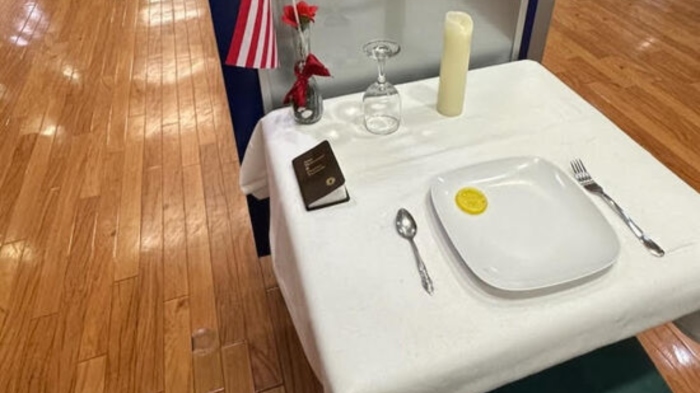Kentucky VA facility yanks Bible from POW/MIA table after complaint: 'Tarantula on a wedding cake'

Officials at Department of Veterans Affairs facilities in Lexington, Kentucky, removed a Bible from a commemorative table for missing service members and prisoners of war following a complaint from a nonprofit civil rights organization.
Attorney Michael Weinstein of the Military Religious Freedom Foundation (MRFF) sent a letter on Nov. 14 to executive director of the Lexington VA Healthcare System, Russell Armstead, on behalf of 12 veteran clients, arguing that the display of a Bible on the facility's POW/MIA table violated Department of Defense policy and the Establishment Clause of the U.S. Constitution, according to a press release from the organization.
Following the complaint from MRFF, which threatened "aggressive and highly visible federal litigation," the VA replaced the Bible on the table with a blank journal, according to a Nov. 28 letter from Armstead.
The POW/MIA table, also known as the "Missing Man Table," is a tradition that emerged from Vietnam War veterans who wanted to commemorate service members who were missing in action. Clad with a white tablecloth, the tables typically feature an empty chair, a single candle, an inverted glass, a ribboned rose in a vase, and a book of faith that is "optional," according to the Department of Defense. The table also usually has a plate with a slice of lemon and salt.
"As Medical Center Director, I am sorry to hear that you and twelve Veteran patients feel your religious rights were infringed upon," Armstead wrote to MRFF in part. "Respecting the dignity of every Veteran is very important to us. We are committed to listening to and addressing all Veteran concerns as we ensure safe, high quality care for all Veterans."
Armstead went on to explain in the letter that after consulting with lawyers and official manuals, he decided to remove the Gideon's New Testament from the Missing Man Tables at facilities in VA Lexington Health Care System.
"We are standardizing the Missing Man Table displays across the Lexington Health Care System to ensure consistency and rendering of honor," he wrote. "All table displays within VA Lexington Health Care System will contain the following: small table, white tablecloth, single rose, vase, yellow ribbon, slice of lemon, salt, bread plate, glass, candle empty chair, and a journal."
The American Legion passed a resolution in 1985 to set up such tables at their events, though they did not officially establish the Bible as the book that should be placed on them.
Weinstein told The Christian Post that of the 12 clients involved in the case, seven of them are Christians.
"We've been fighting these Christian materials on POW/MIA tables for many years," Weinstein said. "Many military installations, many VA installations, have gone to federal court about it. That thing sticks out like a tarantula on a wedding cake. It was never part of the original history of the table when it was first started in any way, shape, or form."
"It comes down to three things that most people don't understand: time, place, and manner," Weinstein also said. "If they stuck that table at a McDonald's or in a Costco or In-and-Out Burger or Hobby Lobby or Chick-fil-A, not a problem. That's a private place. This is the people's place. It's the government, and they're endorsing it. That's why I made it clear that if they put a Satanic Bible or a Quran or the Book of Mormon, there'd be blood in the streets."
"So they did the right thing," he added. "We're very pleased about it."
MRFF Senior Research Director Chris Rodda echoed Weinstein, telling CP that what Armstead did was "in accordance with VA regulations."
"VA regulations prohibit having any permanent religious display of only one religion," she said. "Even the chapels in VA facilities have to be religiously neutral, unless an actual service for a particular religion is going on."
According to a press release from MRFF, "Christian nationalists" at the VA facility in Lexington at one point removed the Missing Man Table entirely amid the controversy.
Rodda defined "Christian nationalists" to CP as "people who believe we're a Christian nation, and who do things to promote their belief that America is a Christian nation, such as having a Bible on what should be a secular government display honoring all POWs, MIAs, veterans."
"They insist on having a Bible, and they buy into this myth promoted by fake historians like David Barton that America was founded as a Christian nation, and they're trying to reclaim it as a Christian nation or whatever, when that's not the case at all," she insisted.
Melissa Holland, who serves as interim executive director of the ecumenical Kentucky Council of Churches, said she was not upset by the Lexington VA's move, according to local NPR affiliate WEKU.
“I believe if you wanted to be fair, there are displays that show the various symbols of all religions," she said. "And if they put something like that on display to honor all veterans, no matter what their religion is, it would be more appropriate."
“The one thing that you might get kicked back on, is those who claim to be atheists," she added. "Is it fair to leave out the soldiers that are atheist? And are their families going to kick back?”
The Department of Veterans Affairs did not respond to CP's request for comment by the time of publication.
MRFF has conducted other high-profile litigation to remove overtly Christian symbols from military institutions, such as urging the U.S. Merchant Marine Academy (USMMA) in Kings Point, New York, earlier this year to take down a painting of Jesus in their administrative building. The academy first covered up the painting in response to the complaint and ultimately moved it to the school chapel.
Jon Brown is a reporter for The Christian Post. Send news tips to jon.brown@christianpost.com




























